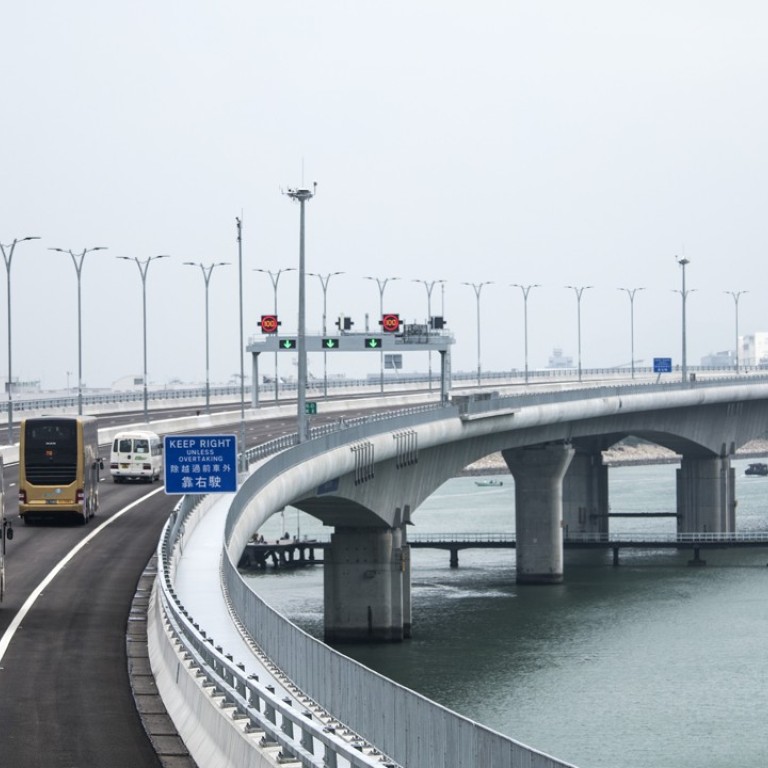
Hongkongers need to be told more about advantages of the Greater Bay Area
- The Hong Kong-Zhuhai-Macau Bridge opens up chances to live and work in the Greater Bay area, but SAR residents need help to find out about them
After a decade of construction work, and billions in investment, the Hong Kong-Zhuhai-Macau Bridge was formally opened on October 23, signalling closer links between the three cities in the Greater Bay Area (GBA).
Meanwhile, the high-speed railway linking Hong Kong and Guangzhou, launched officially a month earlier, now brings people from the Bay Area to Hong Kong in a faster, more efficient way. The strategic investment in infrastructure promoting Hong Kong and Bay Area development is a laudable goal. But do Hong Kong people fully understand and appreciate the development opportunities available in the GBA?
In order to better understand how Hongkongers perceive and evaluate such opportunities, Lingnan University and Sun Yat-Sen University jointly conducted a telephone survey, focusing on examining Hong Kong people’s perceptions and evaluations of GBA development. During the period from August 15-27 2018, 1,033 Hong Kong residents aged 18 or older were interviewed as part of the survey to learn about their views and attitudes towards GBA development.
The results focus on three main areas: the relationship between Hong Kong residents and the GBA, their perception and evaluation of the GBA, and their concerns about living in the GBA.
The two universities recently released a research report titled “Perception & Evaluation of Hong Kong Residents of the Greater Bay Area Development”. In addition to the suggestion of introducing policies to promote a better understanding of the GBA among Hong Kong residents, academics from both universities proposed new models of cooperation between Hong Kong and other GBA cities, such as the mutual use of health care vouchers and old age allowances.
The relationship between Hong Kong residents and the GBA
53.9 per cent of the respondents claimed not to have visited the GBA (excluding Hong Kong and Macau) in the past year, with only 4.6 per cent having visited the GBA 13 times or more (more than one visit per month on average). Among respondents who had visited the GBA in the past year, 59.2 per cent and 20.5 per cent listed “sightseeing” and “food” as their main purposes for visiting, respectively, while only 16.7 per cent claimed to have gone for “work”. Forty-seven per cent of visitors to the GBA listed Shenzhen as their destination, followed by Guangzhou (40.1 per cent).
Hong Kong residents’ perception and evaluation of the GBA
The survey showed that, while most respondents (37.5 per cent) listed entertainment as the GBA’s greatest attraction, they also listed food safety (41.2 per cent) and public security (30.6 per cent) as areas most in need of improvement.
Hong Kong residents’ concerns about living in the GBA
When asked whether they were concerned about finding the right job if they were to live in the GBA (0 for “not at all concerned” and 10 for “extremely concerned”), 36.2 per cent of respondents said they were concerned about finding the right job in the GBA (ranging between 6-10), while 19.2 per cent claimed to be “not at all concerned” (0). In addition, more than 40 per cent (42.5 per cent) were concerned about losing their benefits in Hong Kong on relocating to the GBA.
Based on the survey findings, sightseeing-based tourism was a key form of interaction between Hong Kong residents and GBA cities, as more than half of respondents had not visited the GBA in the past year, while those who had listed sightseeing as their main purpose. It is reasonable to anticipate that the Guangzhou-Shenzhen-Hong Kong Express Rail Link and the Hong Kong-Zhuhai-Macau Bridge will create easy access to facilitate exchange between these two areas.
Further Government action needed
One point which deserves attention is that in addition to “entertainment” and “food”, governing authorities should provide more information about business and employment, to help Hong Kong residents better understand business and career development opportunities in the GBA.
While planning initiatives and policies aimed at helping the public have been launched in the area, further publicity is still required about their implementation and how they can benefit Hong Kong residents. Meanwhile, the HKSAR Government should explore new models of cooperation with GBA cities to facilitate Hong Kong residents living and working in the GBA and to enhance cooperation in areas such as Hong Kong residents enjoying previous benefits (such as health care vouchers and old age allowances), their children’s education and the GBA tax system.
The survey shows Hong Kong citizens’ general understanding of the GBA is insufficient and that most of them have more experience of tourism than work or residency. Achieving the strategic goals of making the GBA a major bay economic zone comparable to Tokyo Bay and Florida Bay, depends on how governments in the region coordinate and work together to ensure different measures and policies on residency, work, education, health care and social welfare can attract more people across the region to take advantage of development opportunities in the GBA.

